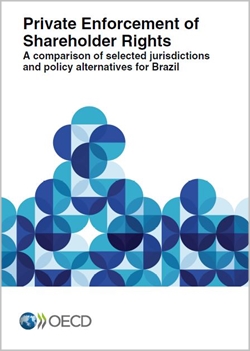Brazil
Private Enforcement of Shareholder Rights: A Comparison of Selected Jurisdictions and Policy Alternatives for Brazil
|
Published 18 November 2020
|
Download the full pdf
The G20/OECD Principles of Corporate Governance state that “experience has shown that an important determinant of the degree to which shareholder rights are protected is whether effective methods exist to obtain redress for grievances at a reasonable cost and without excessive delay.” The G20/OECD Principles also highlight that “there is some risk that a legal system which enables any investor to challenge corporate activity in the courts can become prone to excessive litigation.” Consequently, legislators and regulators must strike a balance between adequate incentives for investors to find redress for infringement of their ownership rights and avoiding frivolous litigation that may drain valuable resources from companies. Building on a comparative review of frameworks from nine other countries – France, Germany, Israel, Italy, Portugal, Singapore, Spain, the US and the UK – this OECD report, Private Enforcement of Shareholder Rights, recommends a range of actions to address weaknesses in the frameworks for derivative suits and arbitration in Brazil. Policy alternatives offered for Brazil seek to address procedural barriers that minority shareholders must surpass before filing derivative claims. Likewise, the cost allocation between the winning and losing parties serves as another important disincentive for effective private enforcement through derivative lawsuits. Finally, an arbitration framework designed mainly for commercial disputes with two parties might not work adequately for collective or multiparty corporate arbitrations, where, for example, confidentiality creates a number of challenges.
|
|
|
Related Documents
